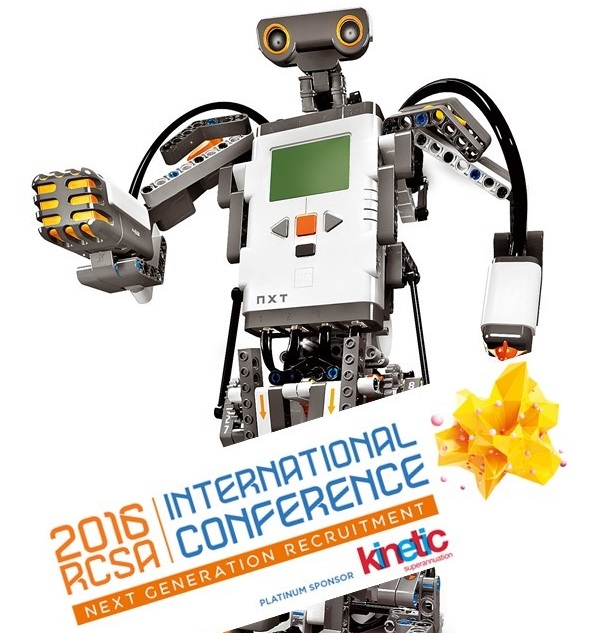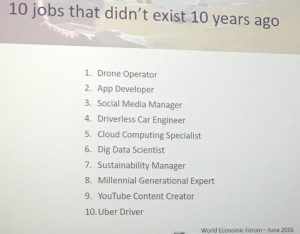You didn’t need to be at last week’s RCSA (Recruitment and Consulting Services Association) annual 2016 Conference to know that the world of work is changing…… and at a rapid pace. But by being at the RCSA Conference everyone in the room got a pretty intense insight in to the future of work and what that is going to mean from a day to day – operational perspective for businesses, workers and recruitment agencies.
The pace of change is scary and depending on whether you are a glass half full or glass half empty kind of person; you’ll either stick your head in the sand and let the new world of work pass you by or you’ll get on the front foot and adapt and prepare yourself and/or your business for the future of work.
Many of us don’t stop to think about it, however the jobs we perform for work are going to look very different in the future.
Courtesy of keynote speaker: Steve Shepherd
What’s driving this change to the traditional world of work that we have known? Here is what I took away from the RCSA Conference:
The Rise of Machines
- 40-45% of all work related tasks will be automated by 2030
- 5 million jobs will be replaced by technology in the next 10 to 15 years
“Smart machines now collect our highway tolls, check us out at stores, take our blood pressure, massage our backs, give us directions, answer our phones, print our documents, transmit our messages, read our books, turn on our lights, guard our homes, fly our planes and drive our cars.” Fiona Anson
The Flexible Work Force
- Part time work is growing at 3 x the rate of full time work
- 1 in 3 people will work casually by 2020
As a result, underemployment is on the rise. More people will hold multiple jobs, giving them increased workplace flexibility.
Millennials
- They are on their way and there is nothing we can do to stop them. Born from 1981 to 2000, they will make up 75% of our workforce by 2025. Millennials will swap jobs on average every 3.4 years. With them comes a lack of experience.
Statistics courtesy of Fiona Anson – The Workible Network
A perfect example is the Uber Driver. Many of the current Uber Drivers perform this job as a second job. They are Uber drivers on weekends, evenings, in and around their other job/s. They do this to supplement their income, to give them the flexibility they are seeking, to work when it suits them.
What does this mean for business?
The workforce of the next decade will be more like a movie crew….” Gary Stewart, CEO, Odesk
- To secure the best talent, business will need to think differently about how they engage their workers, allowing them flexibility to pursue other opportunities simultaneously or to travel or volunteer or do what they are passionate about.
- Work will no longer be performed from an office filled with workers from the one organisation. Work will be performed for an organisation anywhere in the world. We are already seeing this happen with platforms like Freelancer and Task Rabbit however organisations will need to adapt and adjust to take advantage of the best talent and leverage this model of worker engagement.
- Businesses will need to build their own talent pools or utilise recruitment agencies to manage talent pools so they have the right talent with the right skills, available at the right time. Managing this type of talent pool will take consistent time and effort and businesses will need to engage workers through their employer brand and through what drives and motivates them; flexible work hours, cash bonuses, training and development – not by simply paying the highest hourly rate.
While you might think these changes are years away; that you don’t need to worry about this complete shift in the way we work and that this won’t happen in Ballarat or Geelong or wherever it is you are based because your community is different – the world of work and change is inevitable no matter where you are. Preparing your business for the new look future workforce requires planning and preparation now. What are you doing to prepare your workplace for the workforce of the future?



